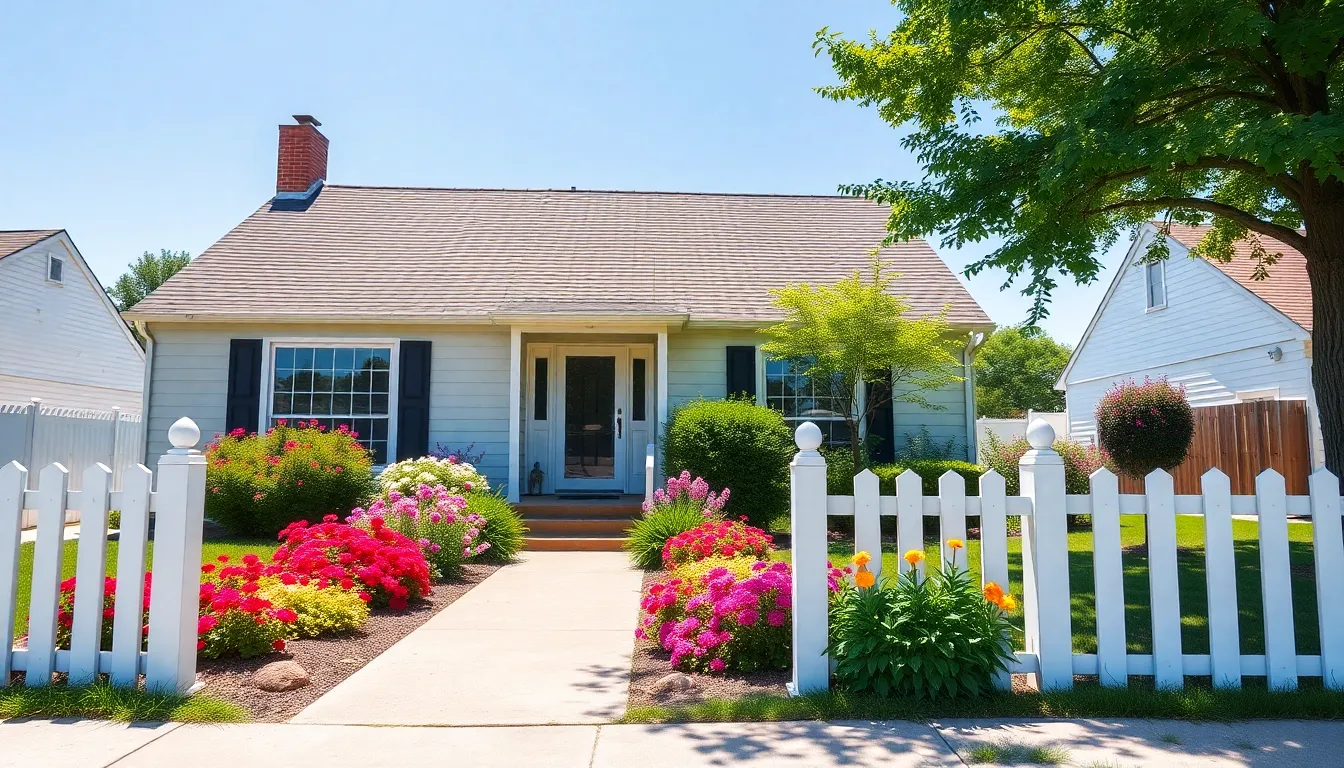When it comes to protecting your castle, finding the right home insurance is like searching for a needle in a haystack—if that haystack were filled with confusing jargon and endless options. But fear not! The quest for “home insurance near me” doesn’t have to be a daunting adventure. With a little guidance, it can be as easy as pie—or at least as easy as ordering takeout on a Friday night.
Table of Contents
ToggleUnderstanding Home Insurance
Home insurance provides financial protection against damage or loss to a homeowner’s property. Coverage typically includes damage from fire, storms, theft, and other specified perils. Additional liability coverage protects against legal claims from injuries occurring on the property.
Homeowners often face various policy types, including basic, broad, and special forms. Basic policies cover essential risks like fire and theft. Broad forms expand coverage to include property damage from additional hazards. Special forms offer the most comprehensive protection, covering all perils except those explicitly excluded.
Deductibles play a crucial role in home insurance. A deductible is the amount a homeowner pays out of pocket before the insurance kicks in. Higher deductibles can lower premium costs but increase personal financial risk in the event of a claim.
Understanding policy limits is vital for adequate protection. Policy limits represent the maximum amount an insurer will pay for covered losses. Homeowners should evaluate their property’s value and adjust limits accordingly to avoid underinsurance.
Home insurance premiums often depend on factors like location, coverage amount, and the homeowner’s claims history. Homes in areas prone to natural disasters typically face higher premiums. Maintaining a good credit score can also lower premium costs, as insurers often consider credit history when determining rates.
Finding “home insurance near me” involves comparing multiple insurers and their offerings. Online tools simplify this process, allowing easy access to quotes and coverage details. Customers may also seek advice from insurance agents to tailor policies that meet their specific needs.
Importance Of Home Insurance

Home insurance plays a crucial role in protecting financial investments. It shields homeowners from significant losses due to unforeseen events.
Protection Against Natural Disasters
Protection against natural disasters is one of the primary functions of home insurance. Homeowners face risks like hurricanes, earthquakes, and wildfires that can severely damage property. Policies often cover repairs or rebuilding costs after these incidents, providing financial peace of mind. Additionally, some insurers offer specialized coverage for specific disasters, allowing homeowners to tailor their protection. Understanding the terms and conditions of these policies helps ensure proper coverage during critical situations.
Liability Coverage
Liability coverage serves as another vital component of home insurance. This protection safeguards homeowners against claims or lawsuits arising from injuries on their property. If someone slips and falls or suffers an injury during an event, liability coverage can help cover medical expenses and legal fees. The policy often includes coverage for damages to others’ property as well. Having adequate liability protection allows homeowners to live comfortably, knowing they’re safeguarded against unexpected incidents.
Finding Home Insurance Near Me
Locating suitable home insurance options involves specific strategies. Utilizing available resources effectively simplifies the process.
Online Search Strategies
Search engines prove valuable for finding local home insurance. Homeowners can enter “home insurance near me” to generate specific results. Online comparison tools offer a way to evaluate various policies side by side. Reading customer reviews provides insights into company performance. Many insurance providers maintain user-friendly websites, allowing online quote requests. Some sites offer tailored recommendations based on individual circumstances. Additionally, filtering search results by coverage type, price, and customer ratings enhances the selection process.
Asking Local Agents
Local agents offer personalized guidance when searching for home insurance. Engaging with agents helps clarify complex terms and policy details. Many agents possess knowledge of the local market, identifying potential risks that require coverage. Discussing needs with an agent generates customized policy suggestions. Furthermore, local agents often have established relationships with insurers, potentially leading to better rates. Choosing a reputable agent ensures trustworthy advice throughout the selection process. Many homebuyers find peace of mind through direct interaction, fostering confidence in their insurance choices.
Comparing Insurance Policies
Comparing home insurance policies involves evaluating various elements that affect coverage and costs. Understanding each aspect ensures homeowners choose the best policy for their needs.
Coverage Options
Home insurance policies typically come with several coverage options. Basic forms cover essential risks like fire and vandalism. Broad forms include additional perils, such as water damage and theft. Special forms offer extensive protection for a wide range of risks, covering almost everything except specifically excluded items. Consider replacement cost versus actual cash value when assessing coverage. Replacement cost ensures full compensation for repairs or replacements, while actual cash value accounts for depreciation. Homeowners should prioritize their unique needs to select the appropriate coverage.
Premium Costs
Premium costs represent an important factor in the insurance decision. Various elements influence these costs, including home location, property value, and claims history. Homes in high-risk areas typically incur higher premiums due to increased likelihood of natural disasters. Additionally, the chosen deductible impacts premium amounts; higher deductibles often lead to lower premiums. Home insurance discounts may also apply for bundled policies, security systems, or claims-free records. Evaluating these elements helps homeowners find competitive rates while ensuring adequate coverage.
Tips For Choosing The Right Policy
Assess coverage needs first. Homeowners should evaluate their personal assets and risks to determine the level of protection necessary. Understanding specific requirements can lead to more informed decision-making.
Shop around effectively. Gathering quotes from multiple insurance providers allows for better comparisons. This process ensures homeowners consider various policy features and pricing options.
Read the fine print carefully. Every insurance policy contains essential details, including exclusions and limitations. Awareness of these aspects can prevent unexpected outcomes during a claim.
Prioritize local agents. Engaging with professionals familiar with the area fosters better guidance tailored to unique risks. Local agents often provide insights into available discounts based on regional factors.
Analyze deductibles and limits. Higher deductibles can lower monthly premiums, which affects overall affordability. Balancing these figures ensures adequate coverage without excessive spending.
Explore additional discounts. Many insurers offer reductions for bundling policies or installing security systems. Identifying eligibility can significantly lower premium costs.
Consider the insurer’s reputation. Research customer reviews and ratings to gauge satisfaction levels. A reputable provider likely delivers reliable service and swift claims processing.
Evaluate policy flexibility. Choosing a policy with customization options can accommodate future changes in needs. Flexibility allows homeowners to adapt coverage as circumstances evolve.
Finding the right home insurance doesn’t have to be overwhelming. By utilizing local resources and online tools, homeowners can navigate the options available to them. The key is to understand personal coverage needs and compare policies effectively to ensure adequate protection.
Engaging with local agents can provide valuable insights tailored to specific situations. With the right approach, homeowners can secure a policy that not only fits their budget but also offers peace of mind against unexpected events. Taking the time to assess options will lead to informed decisions that protect both the home and financial investments.


